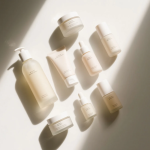Nature vs. Science in Your Skincare Routine 🌱🔬
“Only natural products touch my face.”
If you’ve ever heard someone say this — or said it yourself — you’re not alone.
Over the past decade, the beauty industry has seen a massive surge in “natural,” “clean,” and “organic” skincare. Social media influencers and wellness brands often promote natural ingredients like honey, turmeric, rosehip oil, or green tea as miracle cures for every skin woe imaginable. But is natural skincare really better? More importantly: does it actually work?
Let’s dive into the truth behind natural skincare — separating real results from marketing myths, and highlighting what dermatologists genuinely recommend.
What “Natural” Skincare Really Means (Spoiler: It’s Complicated)
Here’s the first reality check: the term “natural” isn’t regulated by the FDA or most international cosmetic boards. That means any brand can slap the word “natural” on its product, regardless of how processed or synthetic its ingredients may be.
🔍 Common misconceptions:
- “Natural” = safer (Not always)
- “Chemical” = dangerous (False: water is a chemical too)
- “Organic” = more effective (Not guaranteed)
Dermatologist Insight:
Dr. Mona Gohara, a Yale-trained dermatologist, explains that the term “natural” is mostly a marketing strategy. What matters more is evidence-based efficacy and safety — not whether an ingredient came from a tree or a lab.
When Natural Ingredients DO Work ✅
Some natural ingredients have been extensively researched and shown to provide real skincare benefits. These include:
1. Aloe Vera 🌵
- Soothes irritated or sunburned skin
- Contains polysaccharides that promote healing
2. Green Tea Extract 🍵
- Rich in antioxidants (especially EGCG)
- Helps reduce inflammation and redness
3. Niacinamide (Vitamin B3)
- Often derived from natural sources like yeast
- Reduces pores, improves skin texture, and supports the skin barrier
4. Rosehip Oil 🌹
- Full of vitamin A and C
- Brightens skin and reduces hyperpigmentation
🧴 Key takeaway:
Some plant-based ingredients do work — when formulated correctly and supported by scientific research.
Natural Doesn’t Always Mean Better (or Safer) ⚠️
Not all natural substances are good for your skin. Just because something grows in the ground doesn’t mean it belongs on your face.
Common “Natural” Ingredients That Can Irritate or Harm:
- Lemon Juice 🍋 — Highly acidic, can disrupt your skin’s pH and cause burns
- Coconut Oil 🥥 — Can clog pores and trigger acne
- Baking Soda — Overly alkaline, strips skin of natural oils
- Essential Oils (like tea tree, lavender) — May cause allergic reactions or irritation, especially on sensitive skin
Dermatologist Warning:
Natural doesn’t equal non-toxic. Many dermatologists report an increase in cases of allergic contact dermatitis due to essential oils and raw DIY treatments.
The Science Behind Synthetic Ingredients 🔬
Many synthetic skincare ingredients are modeled after natural compounds — but refined, stabilized, and tested for safety.
Examples:
- Retinoids (vitamin A derivatives) are synthesized but highly effective for acne and aging.
- Hyaluronic Acid used in skincare is lab-produced but mimics the natural hydrator found in human skin.
✅ Synthetic ingredients are:
- Often more stable than natural ones
- Less likely to oxidize or spoil
- Precisely measured in concentration for effectiveness
🧪 Conclusion:
Sometimes, synthetic = smarter. It’s not a chemical war. It’s about formulation and functionality.
The Hidden Risks of DIY Natural Skincare 🧂🍯🥒
Pinterest and TikTok are overflowing with DIY skincare recipes using pantry staples. While these trends seem harmless, they can cause more harm than good.
Examples of Dangerous DIY Trends:
- Toothpaste on pimples (dries skin, causes irritation)
- Turmeric masks (can stain skin and fabrics)
- Cinnamon or nutmeg scrubs (abrasive and sensitizing)
- Egg white face masks (risk of salmonella contamination)
Dermatologist Insight:
Dr. Hadley King warns that applying untested combinations of kitchen ingredients to your face can cause long-term damage or sensitization.
🚫 Rule of thumb: If it’s not proven safe in lab-tested skincare products, don’t DIY it on your face.
How to Choose the Right Products — Natural or Not ✅
So if natural skincare isn’t always better, and synthetic isn’t always bad — how do you pick products that actually work?
Look For:
- Ingredients backed by clinical trials
- Products formulated for your skin type
- Brands that disclose full ingredient lists
- Fragrance-free or minimal scent for sensitive skin
📝 Top Dermatologist-Approved Ingredients:
- Niacinamide
- Hyaluronic acid
- Salicylic acid (for acne-prone skin)
- Ceramides (for barrier repair)
- Vitamin C (for brightness and antioxidant protection)
Sustainable Doesn’t Mean Sacrificing Science 🌍💖
If you care about natural skincare because of environmental reasons — great! But don’t sacrifice results just for green branding.
Eco-Conscious + Evidence-Based = The Sweet Spot
- Look for brands with refillable packaging
- Support companies with third-party sustainability certifications
- Prioritize biodegradable ingredients over just “plant-based” labels
🌿 Tip: You can support the planet and still use science-backed skincare. It’s not an either/or situation.
The “Natural” Skincare Verdict
Natural skincare can be helpful — but only when backed by science. Don’t let greenwashing or marketing fluff dictate what you put on your skin. Instead, listen to your skin, read labels carefully, and lean into ingredients that are safe, effective, and well-formulated, regardless of their origin.
✨ So whether your serum was born in a laboratory or pressed from a flower, what matters most is that it works — and that your skin loves it.




